Successful Ageing: An Exploration of Theories and Approaches
VerifiedAdded on 2023/01/17
|7
|1925
|92
Essay
AI Summary
This essay delves into the concept of successful ageing, examining its definition and the various factors that contribute to it. It begins by defining successful ageing and then explores historical models, including disengagement, activity, and continuity theories, which offer different perspectives on how individuals navigate the ageing process. The essay further discusses proactive and psychological approaches to successful ageing, highlighting the importance of early intervention, health management, and mental well-being. It also incorporates the opinions of researchers and analysts on the key components of successful ageing, emphasizing the significance of physical and cognitive activity, social engagement, and a meaningful life. The conclusion summarizes the key findings, reinforcing the idea that successful ageing is achievable through a combination of healthy lifestyle choices, social interaction, and proactive strategies.
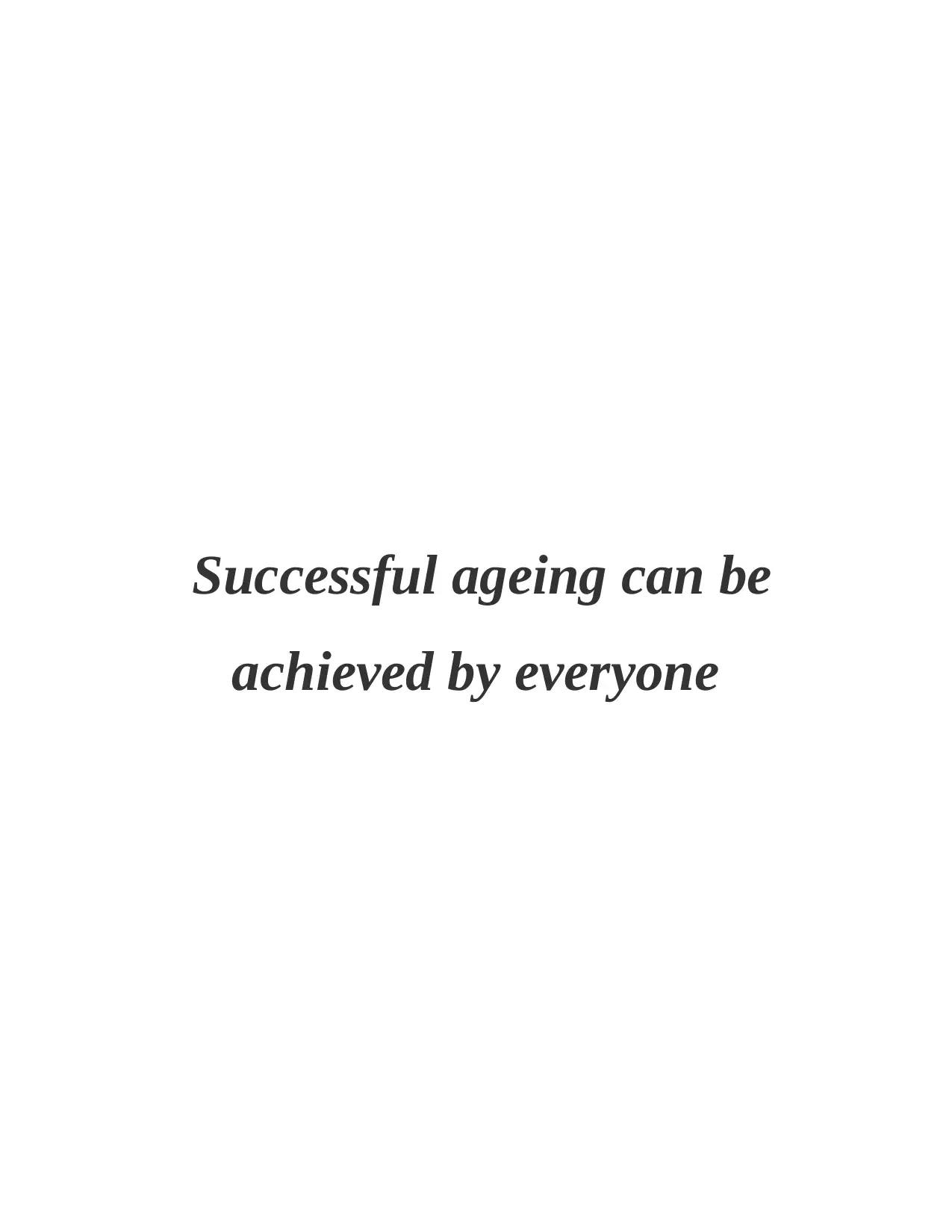
Successful ageing can be
achieved by everyone
achieved by everyone
Paraphrase This Document
Need a fresh take? Get an instant paraphrase of this document with our AI Paraphraser
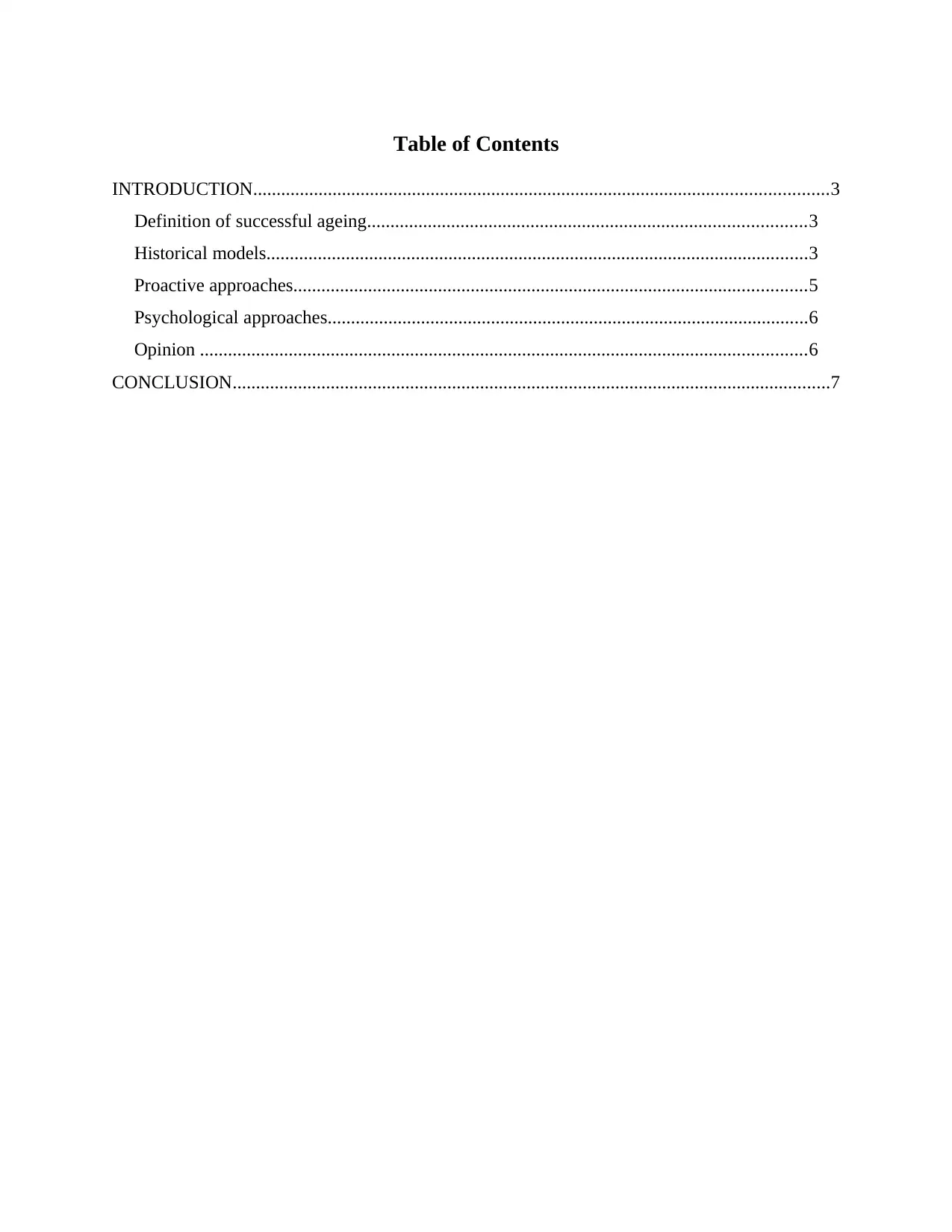
Table of Contents
INTRODUCTION...........................................................................................................................3
Definition of successful ageing..............................................................................................3
Historical models....................................................................................................................3
Proactive approaches..............................................................................................................5
Psychological approaches.......................................................................................................6
Opinion ..................................................................................................................................6
CONCLUSION................................................................................................................................7
INTRODUCTION...........................................................................................................................3
Definition of successful ageing..............................................................................................3
Historical models....................................................................................................................3
Proactive approaches..............................................................................................................5
Psychological approaches.......................................................................................................6
Opinion ..................................................................................................................................6
CONCLUSION................................................................................................................................7
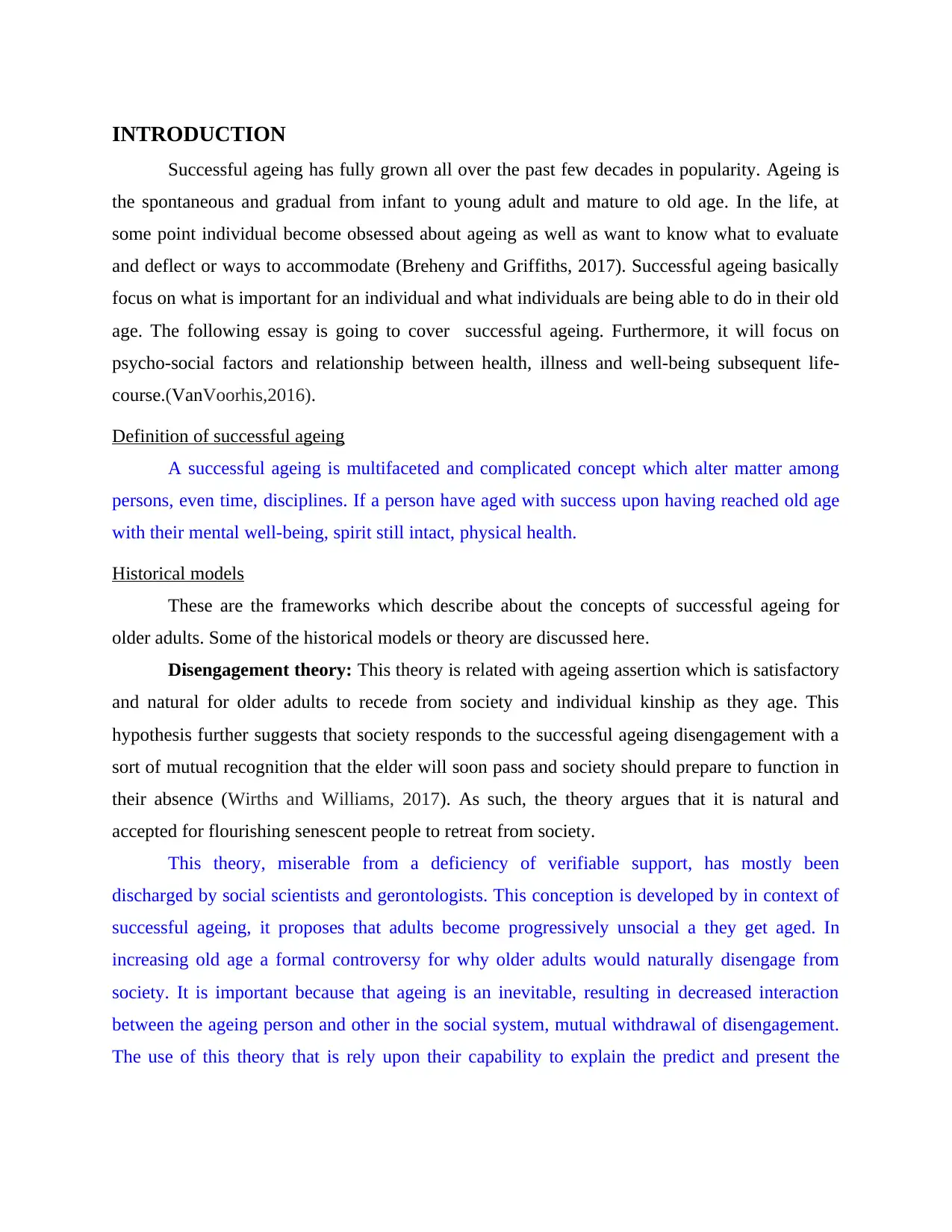
INTRODUCTION
Successful ageing has fully grown all over the past few decades in popularity. Ageing is
the spontaneous and gradual from infant to young adult and mature to old age. In the life, at
some point individual become obsessed about ageing as well as want to know what to evaluate
and deflect or ways to accommodate (Breheny and Griffiths, 2017). Successful ageing basically
focus on what is important for an individual and what individuals are being able to do in their old
age. The following essay is going to cover successful ageing. Furthermore, it will focus on
psycho-social factors and relationship between health, illness and well-being subsequent life-
course.(VanVoorhis,2016).
Definition of successful ageing
A successful ageing is multifaceted and complicated concept which alter matter among
persons, even time, disciplines. If a person have aged with success upon having reached old age
with their mental well-being, spirit still intact, physical health.
Historical models
These are the frameworks which describe about the concepts of successful ageing for
older adults. Some of the historical models or theory are discussed here.
Disengagement theory: This theory is related with ageing assertion which is satisfactory
and natural for older adults to recede from society and individual kinship as they age. This
hypothesis further suggests that society responds to the successful ageing disengagement with a
sort of mutual recognition that the elder will soon pass and society should prepare to function in
their absence (Wirths and Williams, 2017). As such, the theory argues that it is natural and
accepted for flourishing senescent people to retreat from society.
This theory, miserable from a deficiency of verifiable support, has mostly been
discharged by social scientists and gerontologists. This conception is developed by in context of
successful ageing, it proposes that adults become progressively unsocial a they get aged. In
increasing old age a formal controversy for why older adults would naturally disengage from
society. It is important because that ageing is an inevitable, resulting in decreased interaction
between the ageing person and other in the social system, mutual withdrawal of disengagement.
The use of this theory that is rely upon their capability to explain the predict and present the
Successful ageing has fully grown all over the past few decades in popularity. Ageing is
the spontaneous and gradual from infant to young adult and mature to old age. In the life, at
some point individual become obsessed about ageing as well as want to know what to evaluate
and deflect or ways to accommodate (Breheny and Griffiths, 2017). Successful ageing basically
focus on what is important for an individual and what individuals are being able to do in their old
age. The following essay is going to cover successful ageing. Furthermore, it will focus on
psycho-social factors and relationship between health, illness and well-being subsequent life-
course.(VanVoorhis,2016).
Definition of successful ageing
A successful ageing is multifaceted and complicated concept which alter matter among
persons, even time, disciplines. If a person have aged with success upon having reached old age
with their mental well-being, spirit still intact, physical health.
Historical models
These are the frameworks which describe about the concepts of successful ageing for
older adults. Some of the historical models or theory are discussed here.
Disengagement theory: This theory is related with ageing assertion which is satisfactory
and natural for older adults to recede from society and individual kinship as they age. This
hypothesis further suggests that society responds to the successful ageing disengagement with a
sort of mutual recognition that the elder will soon pass and society should prepare to function in
their absence (Wirths and Williams, 2017). As such, the theory argues that it is natural and
accepted for flourishing senescent people to retreat from society.
This theory, miserable from a deficiency of verifiable support, has mostly been
discharged by social scientists and gerontologists. This conception is developed by in context of
successful ageing, it proposes that adults become progressively unsocial a they get aged. In
increasing old age a formal controversy for why older adults would naturally disengage from
society. It is important because that ageing is an inevitable, resulting in decreased interaction
between the ageing person and other in the social system, mutual withdrawal of disengagement.
The use of this theory that is rely upon their capability to explain the predict and present the
⊘ This is a preview!⊘
Do you want full access?
Subscribe today to unlock all pages.

Trusted by 1+ million students worldwide
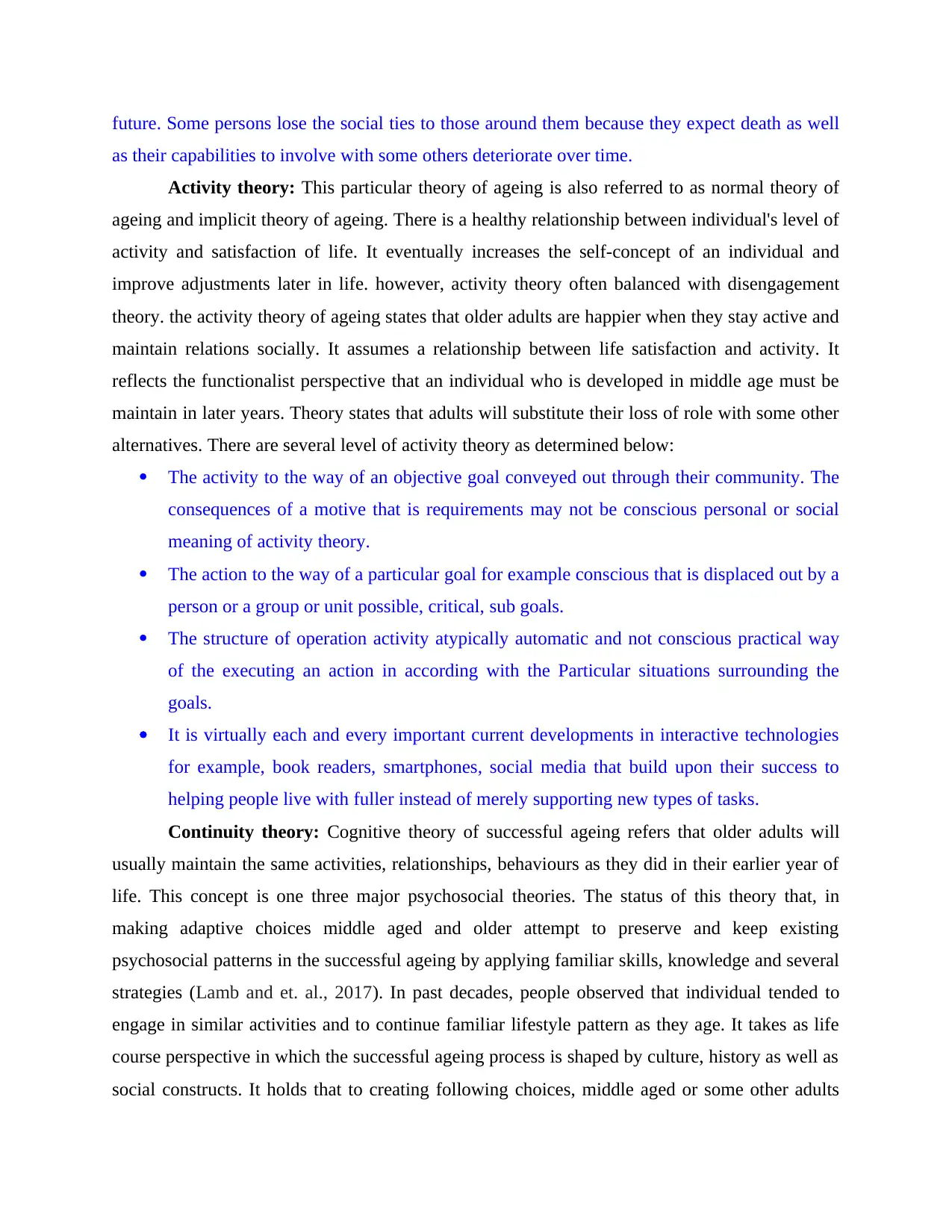
future. Some persons lose the social ties to those around them because they expect death as well
as their capabilities to involve with some others deteriorate over time.
Activity theory: This particular theory of ageing is also referred to as normal theory of
ageing and implicit theory of ageing. There is a healthy relationship between individual's level of
activity and satisfaction of life. It eventually increases the self-concept of an individual and
improve adjustments later in life. however, activity theory often balanced with disengagement
theory. the activity theory of ageing states that older adults are happier when they stay active and
maintain relations socially. It assumes a relationship between life satisfaction and activity. It
reflects the functionalist perspective that an individual who is developed in middle age must be
maintain in later years. Theory states that adults will substitute their loss of role with some other
alternatives. There are several level of activity theory as determined below:
The activity to the way of an objective goal conveyed out through their community. The
consequences of a motive that is requirements may not be conscious personal or social
meaning of activity theory.
The action to the way of a particular goal for example conscious that is displaced out by a
person or a group or unit possible, critical, sub goals.
The structure of operation activity atypically automatic and not conscious practical way
of the executing an action in according with the Particular situations surrounding the
goals.
It is virtually each and every important current developments in interactive technologies
for example, book readers, smartphones, social media that build upon their success to
helping people live with fuller instead of merely supporting new types of tasks.
Continuity theory: Cognitive theory of successful ageing refers that older adults will
usually maintain the same activities, relationships, behaviours as they did in their earlier year of
life. This concept is one three major psychosocial theories. The status of this theory that, in
making adaptive choices middle aged and older attempt to preserve and keep existing
psychosocial patterns in the successful ageing by applying familiar skills, knowledge and several
strategies (Lamb and et. al., 2017). In past decades, people observed that individual tended to
engage in similar activities and to continue familiar lifestyle pattern as they age. It takes as life
course perspective in which the successful ageing process is shaped by culture, history as well as
social constructs. It holds that to creating following choices, middle aged or some other adults
as their capabilities to involve with some others deteriorate over time.
Activity theory: This particular theory of ageing is also referred to as normal theory of
ageing and implicit theory of ageing. There is a healthy relationship between individual's level of
activity and satisfaction of life. It eventually increases the self-concept of an individual and
improve adjustments later in life. however, activity theory often balanced with disengagement
theory. the activity theory of ageing states that older adults are happier when they stay active and
maintain relations socially. It assumes a relationship between life satisfaction and activity. It
reflects the functionalist perspective that an individual who is developed in middle age must be
maintain in later years. Theory states that adults will substitute their loss of role with some other
alternatives. There are several level of activity theory as determined below:
The activity to the way of an objective goal conveyed out through their community. The
consequences of a motive that is requirements may not be conscious personal or social
meaning of activity theory.
The action to the way of a particular goal for example conscious that is displaced out by a
person or a group or unit possible, critical, sub goals.
The structure of operation activity atypically automatic and not conscious practical way
of the executing an action in according with the Particular situations surrounding the
goals.
It is virtually each and every important current developments in interactive technologies
for example, book readers, smartphones, social media that build upon their success to
helping people live with fuller instead of merely supporting new types of tasks.
Continuity theory: Cognitive theory of successful ageing refers that older adults will
usually maintain the same activities, relationships, behaviours as they did in their earlier year of
life. This concept is one three major psychosocial theories. The status of this theory that, in
making adaptive choices middle aged and older attempt to preserve and keep existing
psychosocial patterns in the successful ageing by applying familiar skills, knowledge and several
strategies (Lamb and et. al., 2017). In past decades, people observed that individual tended to
engage in similar activities and to continue familiar lifestyle pattern as they age. It takes as life
course perspective in which the successful ageing process is shaped by culture, history as well as
social constructs. It holds that to creating following choices, middle aged or some other adults
Paraphrase This Document
Need a fresh take? Get an instant paraphrase of this document with our AI Paraphraser
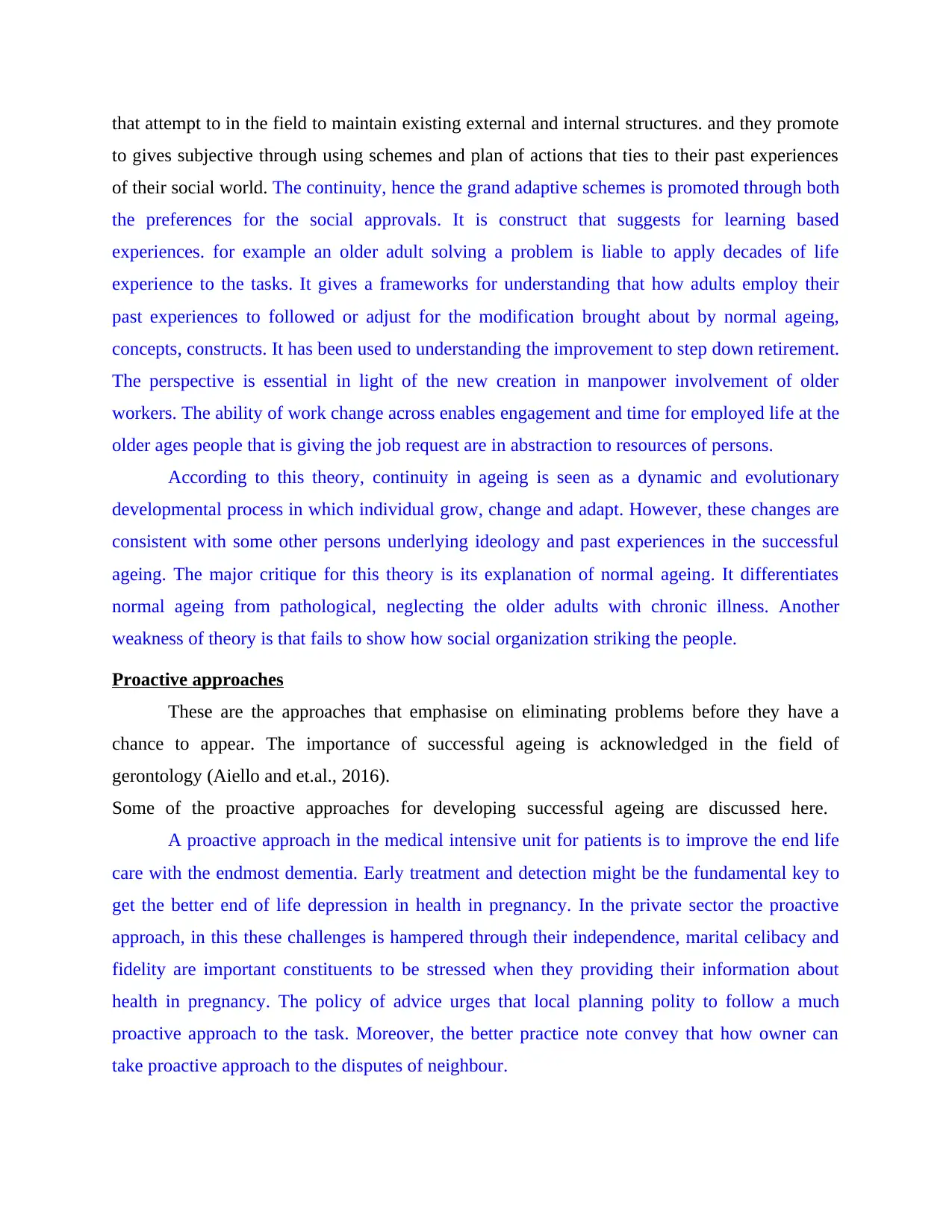
that attempt to in the field to maintain existing external and internal structures. and they promote
to gives subjective through using schemes and plan of actions that ties to their past experiences
of their social world. The continuity, hence the grand adaptive schemes is promoted through both
the preferences for the social approvals. It is construct that suggests for learning based
experiences. for example an older adult solving a problem is liable to apply decades of life
experience to the tasks. It gives a frameworks for understanding that how adults employ their
past experiences to followed or adjust for the modification brought about by normal ageing,
concepts, constructs. It has been used to understanding the improvement to step down retirement.
The perspective is essential in light of the new creation in manpower involvement of older
workers. The ability of work change across enables engagement and time for employed life at the
older ages people that is giving the job request are in abstraction to resources of persons.
According to this theory, continuity in ageing is seen as a dynamic and evolutionary
developmental process in which individual grow, change and adapt. However, these changes are
consistent with some other persons underlying ideology and past experiences in the successful
ageing. The major critique for this theory is its explanation of normal ageing. It differentiates
normal ageing from pathological, neglecting the older adults with chronic illness. Another
weakness of theory is that fails to show how social organization striking the people.
Proactive approaches
These are the approaches that emphasise on eliminating problems before they have a
chance to appear. The importance of successful ageing is acknowledged in the field of
gerontology (Aiello and et.al., 2016).
Some of the proactive approaches for developing successful ageing are discussed here.
A proactive approach in the medical intensive unit for patients is to improve the end life
care with the endmost dementia. Early treatment and detection might be the fundamental key to
get the better end of life depression in health in pregnancy. In the private sector the proactive
approach, in this these challenges is hampered through their independence, marital celibacy and
fidelity are important constituents to be stressed when they providing their information about
health in pregnancy. The policy of advice urges that local planning polity to follow a much
proactive approach to the task. Moreover, the better practice note convey that how owner can
take proactive approach to the disputes of neighbour.
to gives subjective through using schemes and plan of actions that ties to their past experiences
of their social world. The continuity, hence the grand adaptive schemes is promoted through both
the preferences for the social approvals. It is construct that suggests for learning based
experiences. for example an older adult solving a problem is liable to apply decades of life
experience to the tasks. It gives a frameworks for understanding that how adults employ their
past experiences to followed or adjust for the modification brought about by normal ageing,
concepts, constructs. It has been used to understanding the improvement to step down retirement.
The perspective is essential in light of the new creation in manpower involvement of older
workers. The ability of work change across enables engagement and time for employed life at the
older ages people that is giving the job request are in abstraction to resources of persons.
According to this theory, continuity in ageing is seen as a dynamic and evolutionary
developmental process in which individual grow, change and adapt. However, these changes are
consistent with some other persons underlying ideology and past experiences in the successful
ageing. The major critique for this theory is its explanation of normal ageing. It differentiates
normal ageing from pathological, neglecting the older adults with chronic illness. Another
weakness of theory is that fails to show how social organization striking the people.
Proactive approaches
These are the approaches that emphasise on eliminating problems before they have a
chance to appear. The importance of successful ageing is acknowledged in the field of
gerontology (Aiello and et.al., 2016).
Some of the proactive approaches for developing successful ageing are discussed here.
A proactive approach in the medical intensive unit for patients is to improve the end life
care with the endmost dementia. Early treatment and detection might be the fundamental key to
get the better end of life depression in health in pregnancy. In the private sector the proactive
approach, in this these challenges is hampered through their independence, marital celibacy and
fidelity are important constituents to be stressed when they providing their information about
health in pregnancy. The policy of advice urges that local planning polity to follow a much
proactive approach to the task. Moreover, the better practice note convey that how owner can
take proactive approach to the disputes of neighbour.
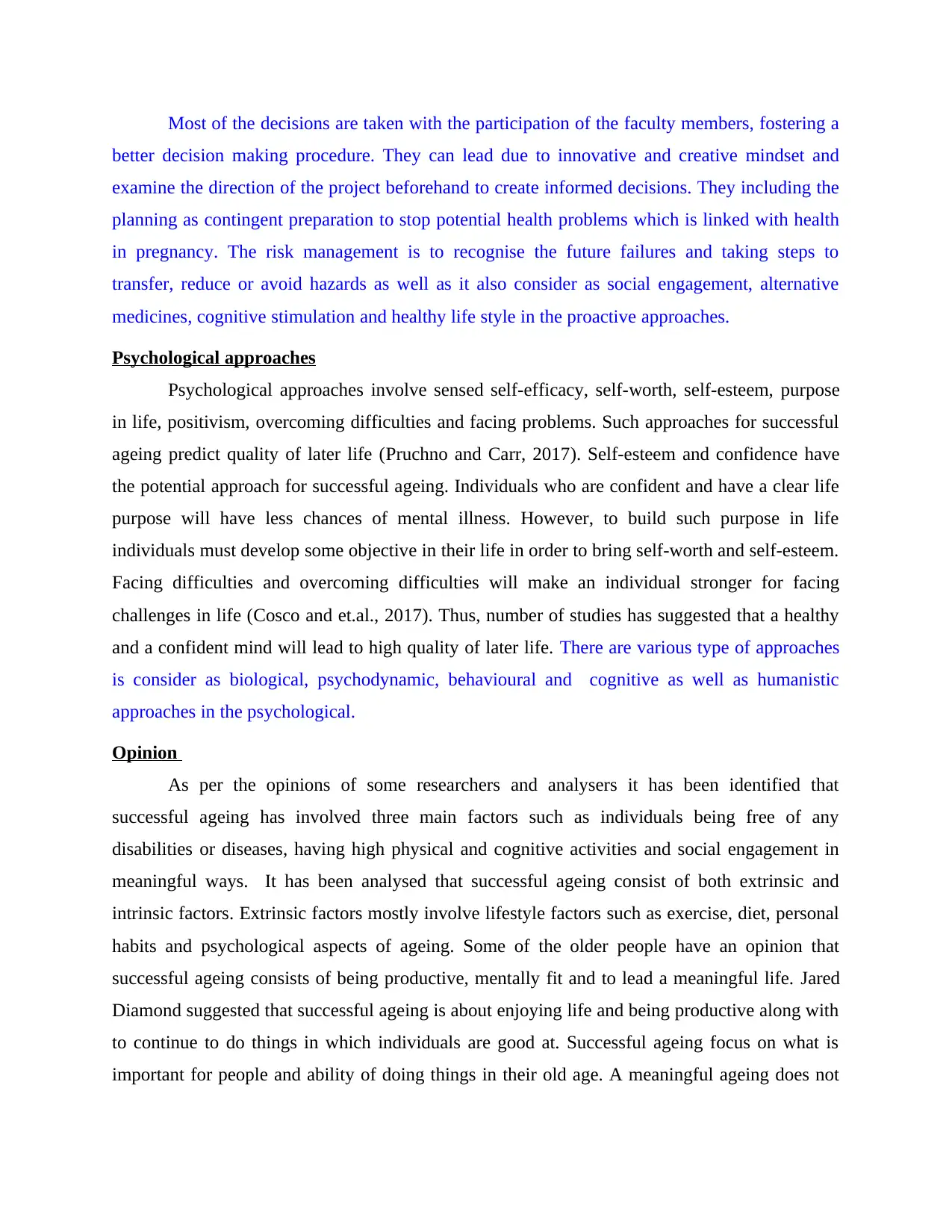
Most of the decisions are taken with the participation of the faculty members, fostering a
better decision making procedure. They can lead due to innovative and creative mindset and
examine the direction of the project beforehand to create informed decisions. They including the
planning as contingent preparation to stop potential health problems which is linked with health
in pregnancy. The risk management is to recognise the future failures and taking steps to
transfer, reduce or avoid hazards as well as it also consider as social engagement, alternative
medicines, cognitive stimulation and healthy life style in the proactive approaches.
Psychological approaches
Psychological approaches involve sensed self-efficacy, self-worth, self-esteem, purpose
in life, positivism, overcoming difficulties and facing problems. Such approaches for successful
ageing predict quality of later life (Pruchno and Carr, 2017). Self-esteem and confidence have
the potential approach for successful ageing. Individuals who are confident and have a clear life
purpose will have less chances of mental illness. However, to build such purpose in life
individuals must develop some objective in their life in order to bring self-worth and self-esteem.
Facing difficulties and overcoming difficulties will make an individual stronger for facing
challenges in life (Cosco and et.al., 2017). Thus, number of studies has suggested that a healthy
and a confident mind will lead to high quality of later life. There are various type of approaches
is consider as biological, psychodynamic, behavioural and cognitive as well as humanistic
approaches in the psychological.
Opinion
As per the opinions of some researchers and analysers it has been identified that
successful ageing has involved three main factors such as individuals being free of any
disabilities or diseases, having high physical and cognitive activities and social engagement in
meaningful ways. It has been analysed that successful ageing consist of both extrinsic and
intrinsic factors. Extrinsic factors mostly involve lifestyle factors such as exercise, diet, personal
habits and psychological aspects of ageing. Some of the older people have an opinion that
successful ageing consists of being productive, mentally fit and to lead a meaningful life. Jared
Diamond suggested that successful ageing is about enjoying life and being productive along with
to continue to do things in which individuals are good at. Successful ageing focus on what is
important for people and ability of doing things in their old age. A meaningful ageing does not
better decision making procedure. They can lead due to innovative and creative mindset and
examine the direction of the project beforehand to create informed decisions. They including the
planning as contingent preparation to stop potential health problems which is linked with health
in pregnancy. The risk management is to recognise the future failures and taking steps to
transfer, reduce or avoid hazards as well as it also consider as social engagement, alternative
medicines, cognitive stimulation and healthy life style in the proactive approaches.
Psychological approaches
Psychological approaches involve sensed self-efficacy, self-worth, self-esteem, purpose
in life, positivism, overcoming difficulties and facing problems. Such approaches for successful
ageing predict quality of later life (Pruchno and Carr, 2017). Self-esteem and confidence have
the potential approach for successful ageing. Individuals who are confident and have a clear life
purpose will have less chances of mental illness. However, to build such purpose in life
individuals must develop some objective in their life in order to bring self-worth and self-esteem.
Facing difficulties and overcoming difficulties will make an individual stronger for facing
challenges in life (Cosco and et.al., 2017). Thus, number of studies has suggested that a healthy
and a confident mind will lead to high quality of later life. There are various type of approaches
is consider as biological, psychodynamic, behavioural and cognitive as well as humanistic
approaches in the psychological.
Opinion
As per the opinions of some researchers and analysers it has been identified that
successful ageing has involved three main factors such as individuals being free of any
disabilities or diseases, having high physical and cognitive activities and social engagement in
meaningful ways. It has been analysed that successful ageing consist of both extrinsic and
intrinsic factors. Extrinsic factors mostly involve lifestyle factors such as exercise, diet, personal
habits and psychological aspects of ageing. Some of the older people have an opinion that
successful ageing consists of being productive, mentally fit and to lead a meaningful life. Jared
Diamond suggested that successful ageing is about enjoying life and being productive along with
to continue to do things in which individuals are good at. Successful ageing focus on what is
important for people and ability of doing things in their old age. A meaningful ageing does not
⊘ This is a preview!⊘
Do you want full access?
Subscribe today to unlock all pages.

Trusted by 1+ million students worldwide
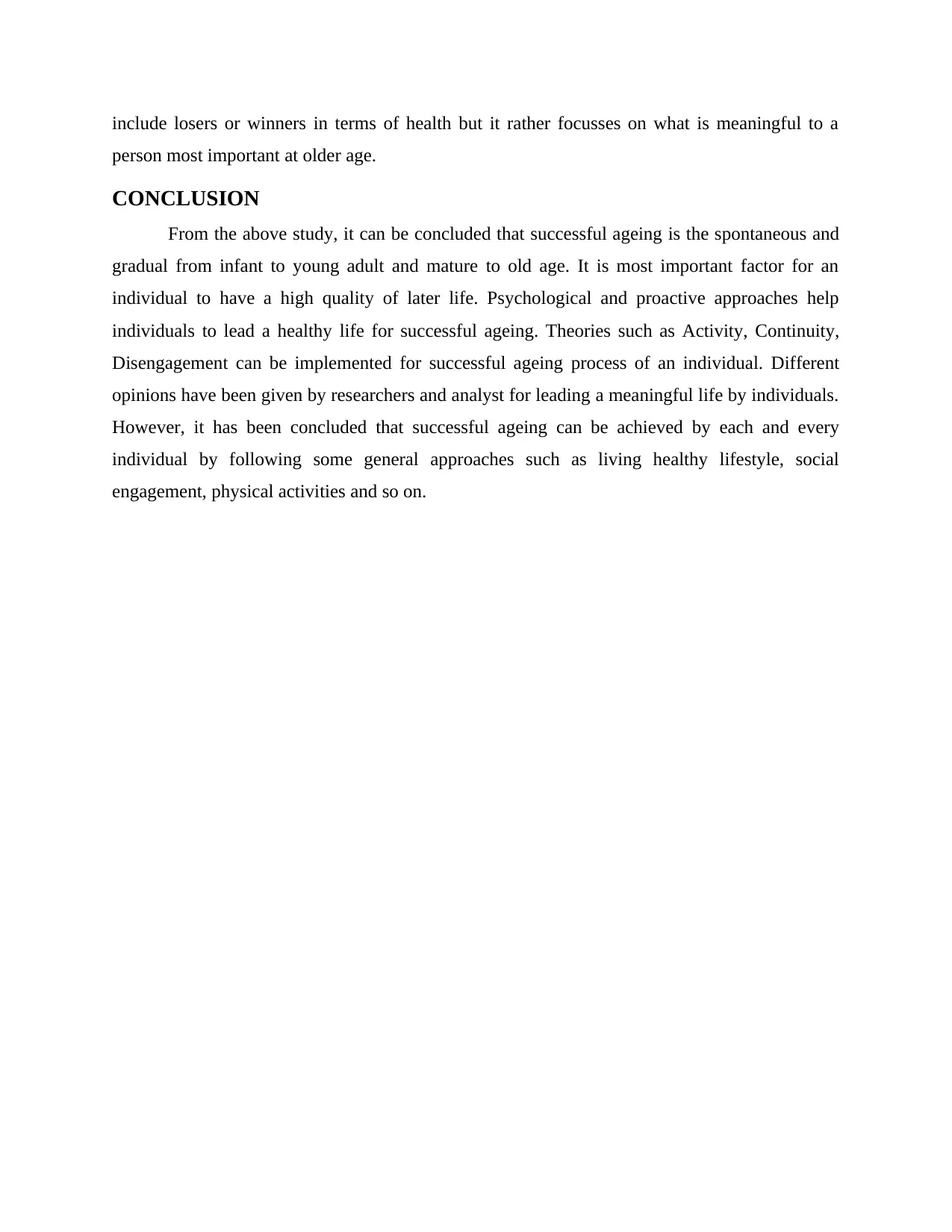
include losers or winners in terms of health but it rather focusses on what is meaningful to a
person most important at older age.
CONCLUSION
From the above study, it can be concluded that successful ageing is the spontaneous and
gradual from infant to young adult and mature to old age. It is most important factor for an
individual to have a high quality of later life. Psychological and proactive approaches help
individuals to lead a healthy life for successful ageing. Theories such as Activity, Continuity,
Disengagement can be implemented for successful ageing process of an individual. Different
opinions have been given by researchers and analyst for leading a meaningful life by individuals.
However, it has been concluded that successful ageing can be achieved by each and every
individual by following some general approaches such as living healthy lifestyle, social
engagement, physical activities and so on.
person most important at older age.
CONCLUSION
From the above study, it can be concluded that successful ageing is the spontaneous and
gradual from infant to young adult and mature to old age. It is most important factor for an
individual to have a high quality of later life. Psychological and proactive approaches help
individuals to lead a healthy life for successful ageing. Theories such as Activity, Continuity,
Disengagement can be implemented for successful ageing process of an individual. Different
opinions have been given by researchers and analyst for leading a meaningful life by individuals.
However, it has been concluded that successful ageing can be achieved by each and every
individual by following some general approaches such as living healthy lifestyle, social
engagement, physical activities and so on.
1 out of 7
Related Documents
Your All-in-One AI-Powered Toolkit for Academic Success.
+13062052269
info@desklib.com
Available 24*7 on WhatsApp / Email
![[object Object]](/_next/static/media/star-bottom.7253800d.svg)
Unlock your academic potential
Copyright © 2020–2026 A2Z Services. All Rights Reserved. Developed and managed by ZUCOL.




